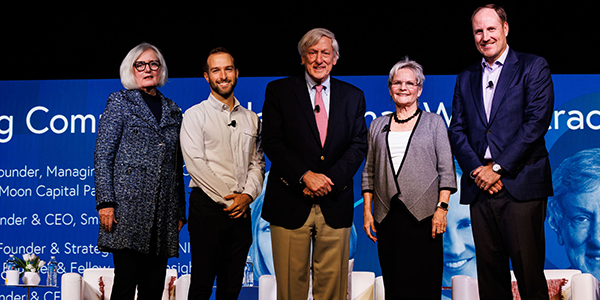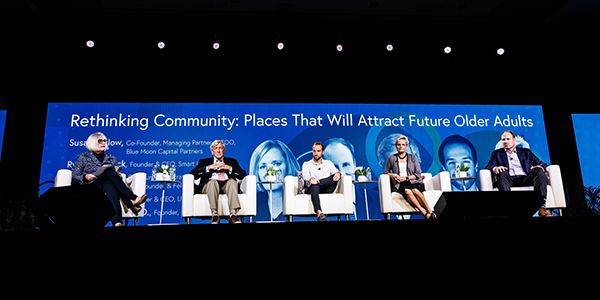Baby boomers may not be ready for assisted care, but they may be ready for something else. But what? Do they want an active adult-type development with certain amenities? Or is it more about seeking a place that offers a sense of community and a personalized lifestyle?
Thought leaders in the fields of aging and longevity explored the question at the 2021 NIC Fall Conference in Houston during a session aptly titled: “Rethinking Community: Places that Will Attract Future Older Adults.”
For the most part, baby boomers are healthy and don’t feel old. They aren’t looking for the care-based housing model that they may have experienced vicariously through their parents. They’re not passive. Instead, they ask themselves, “How do I live my next chapter?” Baby boomers want choice, independence, and a place tailored to their preferences.
“The boomers are finally here,” said panel participant Bob Kramer, NIC co-founder & strategic advisor, and founder & fellow at Nexus Insights. “They are looking for places, activities, and programs to help them repurpose themselves to live with satisfaction and purpose.”
The discussion was led by Susan Barlow, co-founder, managing partner and COO at Blue Moon Capital Partners. Other panelists included Ryan Frederick, founder & CEO, SmartLiving 360; Jake Rothstein, founder & CEO, UpsideHōM; and Sara Zeff Geber, founder of LifeEncore.

Kicking off the session, Barlow asked: “What do baby boomers want?”
Kramer put the discussion in context, noting the huge growth in the number of baby boomers, those in the 65-84 age group. “The demographic wind is at our back,” he said. But instead of looking at demand in terms of age and income, he cited a study on rethinking demand in terms of life expectancy. While the industry mostly cares for people in the last five years of life, baby boomers are not yet customers for a care-driven product.
When rethinking demand, developers and investors should consider what consumers can afford. Baby boomers want health and longevity, but they also want to have the dollars to support themselves. They wonder if their lifespan will match their health span, and their wealth span. Kramer noted that NIC’s study on the “Forgotten Middle” shows that a large number of baby boomers will not be able to afford a traditional community.
Kramer emphasized that baby boomers want to avoid assisted living. Instead, they want experiences that make life worth living for the next, as he put it, “8,000 days.”
Panelist Geber observed that baby boomers seek a sense of community. Her work focuses on “solo agers”—those elders, mostly women, without children or those aging alone for other reasons. In fact, one in five baby boomers is childless. This group does well living alone because they’ve created a community or social network of friends and family for support. “They do not want to give that up,” said Geber.
Communities that offer opportunities to remain active and help provide a sense of purpose will attract these boomers. “Solo agers will need senior housing that appeals to the lives they live today,” she said.
Place Matters
Panelist Frederick emphasized that “active adult" is a product type, not a consumer. He authored a book titled, “Right Place, Right Time.” It looks not just at the physical dwelling space but also the individual’s neighborhood, wider community, financial security, physical and mental health, and sense of purpose. He suggested that developers and operators ask themselves: “Are you in the senior housing business, or are you in the business of creating places and services to help people thrive?”
Frederick cautioned senior living providers about the changing competitive landscape. Active adult projects for baby boomers are only a small sliver of housing options. There are multifamily, multi-generational projects. Co-housing arrangements can facilitate a sense of community. Pocket neighborhoods in walkable locations are another option.
Technology will play a role. UpsideHōM is a technology platform that connects people to housing and services that have been vetted by the company. “Technology can drive positive experiences,” said panelist Rothstein.
The UpsideHōM platform connects older adults to age-diverse apartment communities. The older adult is assigned a personal assistant or navigator to help manage day-to-day life and maintain community connections. Services are tailored to the individual. “No one size fits all,” said Rothstein. Seniors can get food delivered or transportation, but only if they want or need it. “Think about how to customize service and support,” he suggested.
What does this mean to the investor? Kramer noted that it’s crucial to understand the customer and take a wider view. The demand pool of baby boomers is broad, but thin for any particular type of development. Product categories will be highly segmented based on the personal preferences. “This is about the consumer and what they want,” said Kramer.
Moderator Barlow asked the panelists about market risks and what’s ahead.

Frederick noted that the world is more complicated, and people have more choices. “Housing for older adults will be a matter of trial and error,” he said.
Rothstein believes technology will be essential to create a meaningful end-user experience. “We have to be thoughtful about using technology to drive meaningful engagement,” he said.
Solo agers want to continue their lifestyle and may consider a congregate living arrangement if it is presented to them in a way that makes them feel comfortable. Small neighborhoods make more sense for them than big high-rise buildings.
The panelists agreed that the senior living market for baby boomers will be fragmented and diverse. Innovative approaches and new ways of thinking will be needed to meet the demand. “Huge change is coming to our industry,” said Kramer.
About NIC
The National Investment Center for Seniors Housing & Care (NIC) is a nonprofit 501(c)(3) organization whose mission is to support access and choice for America’s seniors by providing data, analytics, and connections that bring together investors and providers.
Connect with NIC
Read More by NIC